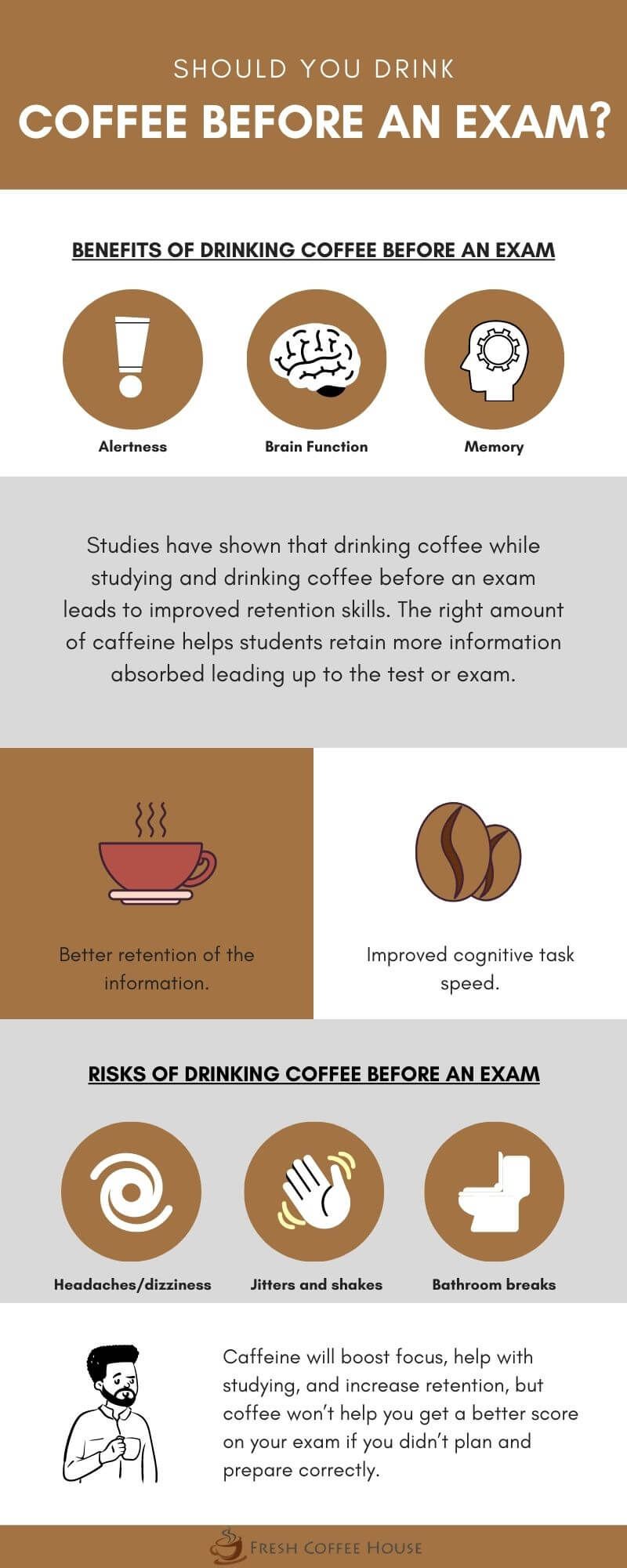Recently I had to take an exam at work for a professional designation. I noticed myself drinking a little more coffee than usual, obviously to help me keep focused and awake while studying. That got me thinking about whether there are any benefits to drinking coffee before an exam or a test. So, I put together this article to help anyone asking the same question.
Studies have shown that drinking coffee while studying and drinking coffee before an exam leads to improved retention skills. The right amount of caffeine helps students retain more information absorbed leading up to the test or exam.
Don’t run off and start chugging coffee before your exam just yet. We should explore some of the benefits and drawbacks of drinking a cup of Joe before your test, make sure you know the right time to have a coffee, and cover how much caffeine is the right amount.
Will Drinking Coffee Before an Exam Help?
Yes, have the right amount of coffee before a difficult task often helps with the results. Caffeine in coffee is known for boosting wakefulness and focus for a period of time.
An article published by Scientific American references a study done by Michael Yassa, a professor of psychology and neuroscience at John Hopkins University, which took a deeper look into the effect coffee had on academic performance.
“We found that those who were administered caffeine actually had better retention of the information we taught them the day before.”
So now we know that drinking coffee can help increase retention, but does that really mean drinking coffee can improve test scores?
The Nutrition Journal published a study in 2007 in which they found 51% of students who drank caffeine performed better on tests.
“Although low doses of caffeine (12.5 to 50mg) have been found to improve cognitive performance and mood, 200mg doses have been found to improve cognitive task speed and accuracy and increase alertness among young adults.”
If only 51% of the students got better grades, then we know that coffee won’t necessarily make you score higher on your exam, but it will aid in productivity and preparation for the tests.
The major takeaway from both articles needs to be that coffee is helpful when preparing for exams. Caffeine will boost focus, help with studying, and increase retention, but coffee won’t help you get a better score on your exam if you didn’t plan and prepare correctly.
Benefits and Risks of Drinking Coffee Before a Test
Benefits
Alertness – One cup of coffee can increase attention and mental alternates, decision making, and retention. No wonder half the world wakes up to a cup of Joe every day.
Brain Function – Some studies suggest that coffee can enhance mental performance such as speaking and reasoning.
Memory – As discussed before, scientists from John Hopkins University have proven that caffeine helps people memorize objects, patterns, and differences.
Risks
Headaches/dizziness – Overdosing on caffeine can cause headaches as well as a range of other side effects such as dizziness and dehydration.
Jitters and shakes – Too much caffeine can cause the jitters. If you are a nervous person who is uneasy just at the thought of writing a test drinking coffee will only amplify your anxiety and may cause jitters and shakes.
Bathroom breaks – Drinking coffee can and most likely will make you want to pee. Having to take bathroom breaks during your exam will cause you to lose precious time. If you pee after coffee, try drinking a shot of espresso instead of a full mug of java. You’ll get a similar boost from the caffeine but from a lot less volume of coffee.

How Long Before the Exam Should You Drink Your Coffee?
Although, some people argue the heavenly aroma of coffee instantly wakes their senses you need at least 10 minutes to feel the effects of caffeine on your body. I will agree the smell of coffee is a pick-me-up, but the real effects of wakefulness and focus require you to drink the coffee not just smell it.
So, how long before a test should you drink your cup of Joe? Well, according to the Wall Street Journal, the US military has developed the perfect schedule for getting the most out of your java.
Their research shows that drinking 200mg of caffeine right when you wake up and another 200mg four hours later give your body the optimal level of focus and ingenuity.
For reference 200mg of caffeine is a medium black coffee from dunking donuts, a tall dark roast from Starbucks, or a double shot of espresso.
Check out Caffeineinformer.com to see how much caffeine is in your favorite cup of coffee.
The four-hour break in between cups of coffee is important because it gives your body time to absorb and get used to the first dose of caffeine before it receives the spike of energy from the second dose.
Use this military-style schedule around your exam to time it correctly. If your test is around noon, wake up by 7 am to have your first cup of coffee at 7:30 am and the second dose at 11:30 am.
Does Anything Other than Coffee Help with Exams?
You can’t count on only coffee to get you through tough study sessions and difficult exams. The key is a healthy balanced diet with the appropriate amount of sleep. Try to eat a handful of these before your next test:
- Blueberries
- Beans (red, black, pinto)
- Apples
- Pecans
- Artichokes
- Prunes
Not only are these helpful for optimal brain function but they’re rich in antioxidants as well.
In case you’re wondering, there are some foods you should avoid when preparing for an exam:
Trans-fats – Neurology.com did a study in 2011 showing how trans-fats block blood from accessing the brain causing less favorable cognitive function and less total cerebral brain volume.
Soft drinks – In an article published by Neuroscience in 2015 scientist proved their test subjects on a high sugar diet were suffering from lower problems solving skills as well as impaired short- and long-term memory.
Summary
So, by now I hope you understand why drinking coffee while preparing for your exam and writing your test can be a good idea. Consider the benefits and risks involved when consuming caffeine and make your own decision accordingly. If you do decide to drink coffee during your exam be sure to follow the military schedule for optimal brain function.
I want to share with you a few good ideas for preparing for an exam that isn’t coffee related as well. Make sure you study in the same manner and environment you plan on writing the test in. If the test is written on a wooden desk, study on a wooden desk or table. If the exam is on a computer study on a computer. I’ve always found that getting used to the environment your stressful test will take place in will help you cope and focus with the test.
Getting uses to the environment could be a simple thing like wearing the same clothes you studied in for the exam, for example, PJ’s or business attire, and eating the same meals on the days you study as the exam dates themselves.
Good Luck!
Related Questions
Can You Drink Too Much Coffee?
In simple terms, a healthy adult can drink up to 400mg of caffeine per day. That about the same as 4 cups of coffee.
Even the most dedicated coffee enthusiasts will agree sometimes too much coffee can be a bad thing. Overindulging on caffeine can lead to high blood pressure, dizziness, shakiness, and headaches. Drinking too much coffee over a long period does increase the chance of heart disease.
When Is the Best Time for A Cup of Coffee?
Not paying attention to when you consume coffee can have some negative impacts. Having a cup of Joe too early in the morning is not healthy and drinking one too late will keep you up all night. Check out this article about the best time to drink coffee if you want to know more.
References
Should you drink coffee before or after a learning task? – https://blogs.scientificamerican.com/the-curious-wavefunction/should-you-drink-coffee-before-or-after-a-learning-task/
Nutrition Journal – https://nutritionj.biomedcentral.com/articles/10.1186/1475-2891-6-35
What does caffeine do to your body? – https://www.medicalnewstoday.com/articles/285194
Harvard Health Blog – https://www.health.harvard.edu/blog/caffeine-healthy-diet-may-boost-memory-thinking-skills-alcohols-effect-uncertain-201406187219
Caffeine as a risk factor for chronic daily headache – https://pubmed.ncbi.nlm.nih.gov/15596744/
I’ve always seen coffee as a way of bringing people together. Everywhere I go people seem to enjoy a fresh cup of coffee and that’s what drives my passion. There’s always a new brew to master, and there’s always a new face to enjoy it with. Hitch a ride with me on a coffee-fueled adventure to find a perfect cup.


